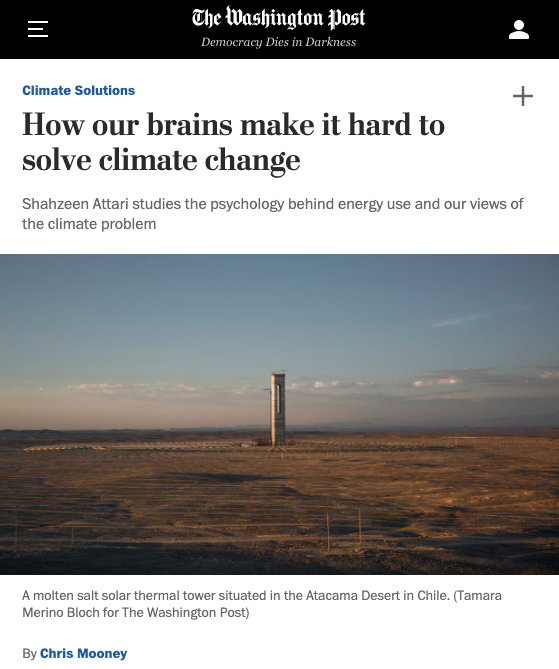Nudgestock - June 11, 2021
Nudgestock 2021: “It’s a day to think differently, where counter-intuitive ideas are discussed, debated and celebrated by the planet’s boldest thinkers.
They’re ready to tell you why things like mindfulness, climate change and vaccine hesitancy are all just load of Behavioural Science. With a side order of genius creativity to boot.” See you there. Free. Virtual. Global.
Also: John Cleese!!
Our lab's work featured in Washington Post
Our work on Perception of water systems co-authored with Kelsey Poinsatte-Jones and Kelsey Hinton is featured in the Washington Post.
“Solving the climate problem requires a lot more than individual behavior,” she emphasizes. “It requires our entire systems to evolve.”
The Power of Stories: Writing the Future of Our Planet - March 31
The Exchange and the National Academies' Roundtable on Science and Technology for Sustainability Present: The Power of Stories: Writing the Future of Our Planet
Together, we are writing the future of our planet. In the same way that we are living with the deeds and decisions of the past, the choices made and actions taken by those of us alive today will bear direct impact on the generations who come after we are gone. But how we imagine our future and tell those stories can serve as a predictor of what is to come. As prelude to the first-ever Nobel Prize Summit at the end of April, Nobel Prize Laureate Martin Chalfie, screenwriter Joe Robert Cole, and novelist Kim Stanley Robinson will examine the way in which those stories have the power to impact our vision of the future.
Moderated by Shahzeen Attari, who researches the factors that motivate action on climate change, this wide-ranging and eclectic conversation promises to be hopeful, optimistic, and above all, inspiring.
Shahzeen will serve on NASEM committee to advise the EPA
An ad hoc committee formed by National Academies of Sciences, Engineering, and Medicine will advise EPA's Office of Research and Development on emerging scientific and technological advances it could use in support of the agency’s mission for protecting human health and the environment over the coming decades.
New paper out: Better rules for judging joules
Climate Museum - Feb 12, 2021
Food by design
IDEO’s Food team uses design to connect, support, and enable leaders and organizations committed to solving the toughest problems across the food system. We’re digging into the decades of intentional policies that have created today’s inequitable food system. Plus, why language matters when talking about the challenges we face, and how agency is key to creating new food systems that work for BIPOC. Shahzeen is featured in this episode discussing the future of food.
Spending a day talking about climate change...
A Matter of Degrees
New podcast begins with a perennial topic for climate folks: does personal behavior change matter? Giving up your climate guilt interviews @billmckibben and @Shahzeen.
Shahzeen receives the IU Bicentennial Medal
“The Bicentennial Medal is awarded to organizations and individuals who, through their personal, professional, artistic, or philanthropic efforts, have broadened the reach of Indiana University around the state, nation, and world.”
This gorgeous medal was designed by IU faculty Jeeyea Kim. More about the design here.
Systemic racism in higher education
“Breaking down the barriers of systemic racism in STEM and achieving the promise of diversity, equity, and inclusion in STEM require unwavering dedication and real work. It is time to make the commitment to be an agent of change.”
I am just one of the 10k+ signatures on this letter to end systemic racism in higher education.
NYT Climate Quiz
Washington Post's climate quiz
Shahzeen and lab profiled in the Washington Post
Wonderful conversation with Chris Mooney about our research and some of the challenges of solving climate change by harnessing human behavior.
New piece in The Conversation
Both conservatives and liberals want a green energy future, but for different reasons — New piece in The Conversation with our wonderful editor Jennifer Weeks. Authors Deidra Miniard, Joe Kantenbacher, and Shahzeen Attari. A summary of our recent paper in PNAS on a Shared vision for a decarbonized future energy system in the United States.
Congrats Deidra!
Deidra Miniard, 3rd year PhD student in our lab, just received a grant to fund her research. She is set to receive $9,100 from the Sustainability Student Research Development Grant program, a partnership between the Office of Sustainability and the Integrated Program in the Environment. Her work will focus on social distancing, environmental justice, and climate change.
Solve Climate Webinar - Indiana wide discussion on climate solutions
Shahzeen joined Sarah Mincey (Director, Integrated Program in the Environment), Janet McCabe (Director of the IU Prepared for Environmental Change), Vernice Riego (High school student and climate activist) and Steven Chybowski (Fellow in City of Fishers, IN) to discuss climate policy and energy transitions for the state of Indiana.
New paper in PNAS - Shared vision for a decarbonized future
Out today:
Shared vision for a decarbonized future energy system in the United States
How do people envision the future energy system in the United States with respect to using fossil fuels, renewable energy, and nuclear energy? Are there shared policy pathways of achieving a decarbonized energy system? Here, we present results of an online survey (n = 2,429) designed to understand public perceptions of the current and future energy mixes in the United States (i.e., energy sources used for electric power, transportation, industrial, commercial, and residential sectors). We investigate support for decarbonization policies and anti-decarbonization policies and the relative importance of climate change as an issue. Surprisingly, we find bipartisan support for a decarbonized energy future. Although there is a shared vision for decarbonization, there are strong partisan differences regarding the policy pathways for getting there. On average, our participants think that climate change is not the most important problem facing the United States today, but they do view climate change as an important issue for the world today and for the United States and the world in the future.
Congrats to Deidra and Joe!
Joe presents at O'Neill's Environmental Policy Seminar
Research Associate Joe Kantenbacher presents our new research that asks what gives Gen Z hope, despair, inspiration? What awaits in the best, likely, and worst possible futures in 2050 and 2100? Stay tuned.
This work is a collaboration with Nathan Gieger and Landon Yoder and funded by the Environmental Resilience Institute.




















